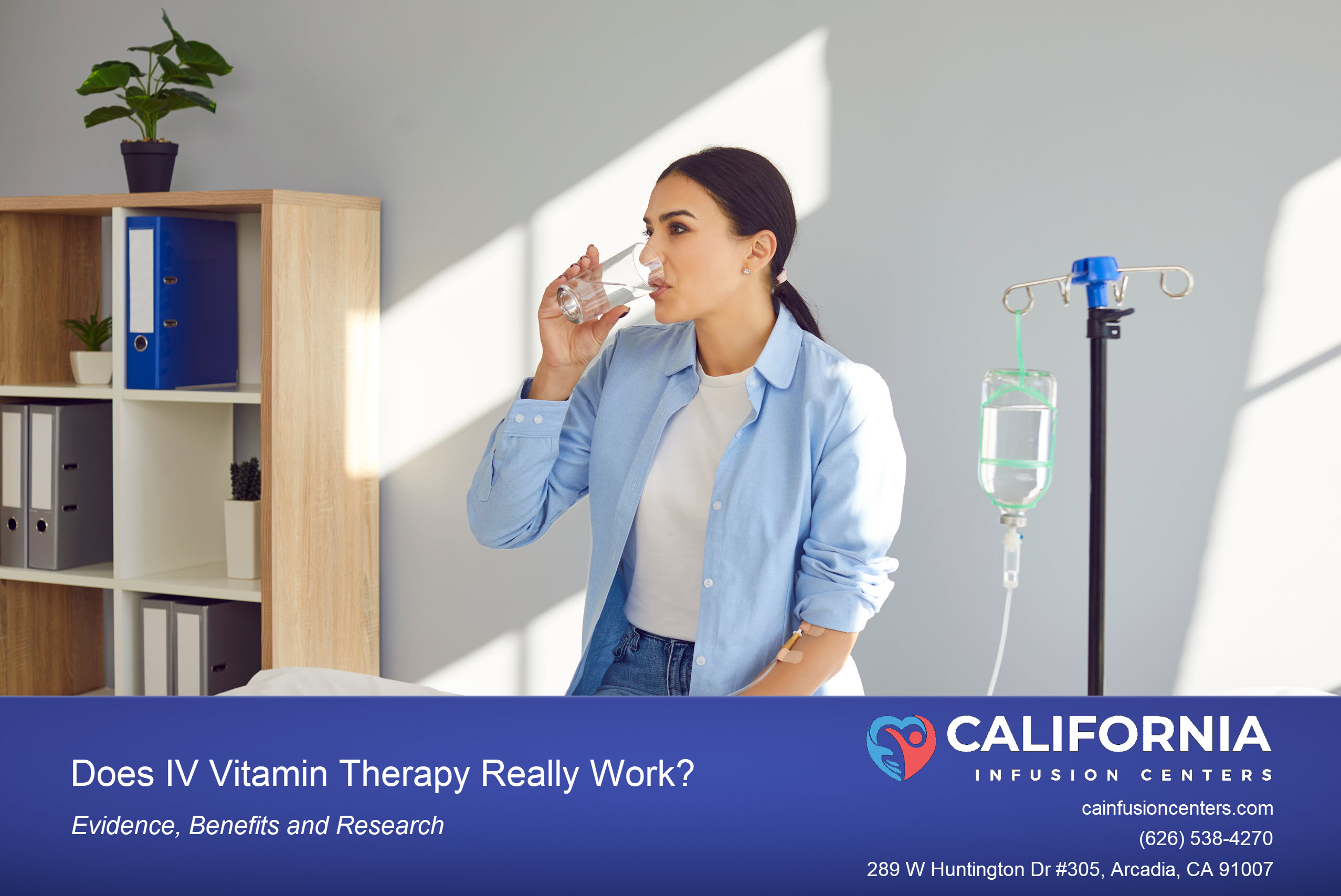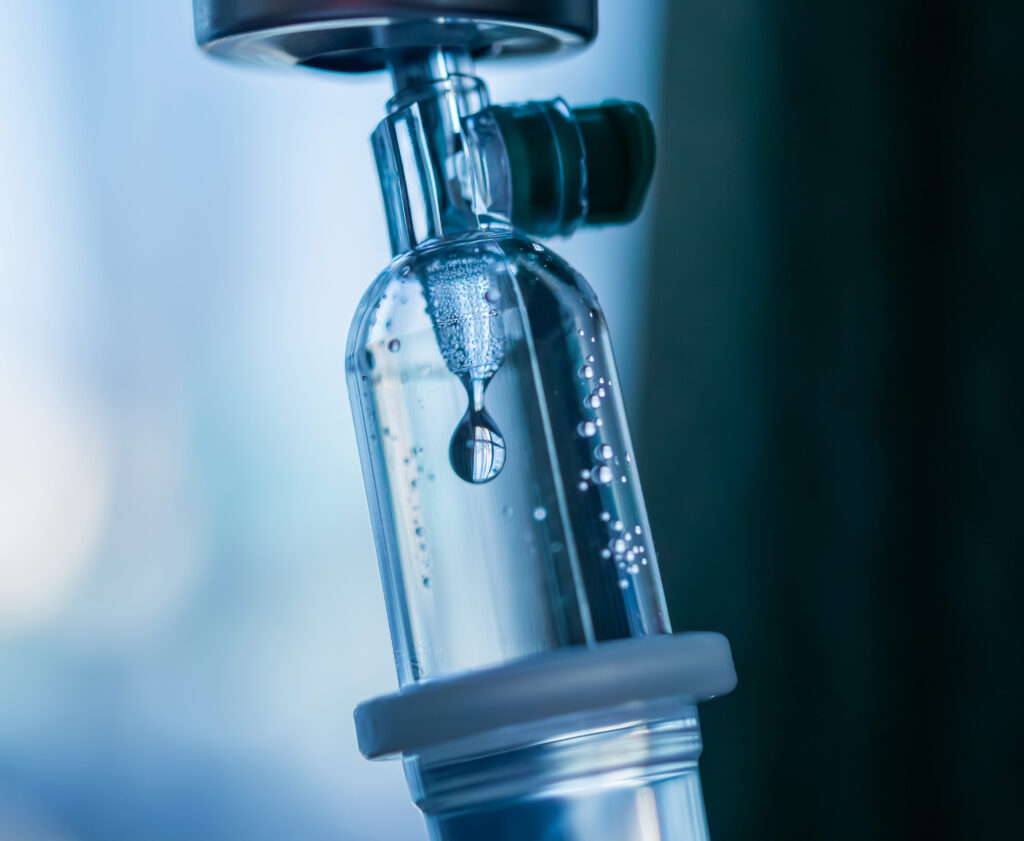Home » IV Vitamin Therapy » Does IV Vitamin Therapy Really Work?

Resource Contents
Does IV vitamin therapy really work? While IV vitamin therapy is widely marketed for energy, hydration and immune support, the strongest evidence comes from its established medical uses. Hospitals rely on IV fluids for dehydration , IV iron for anemia , and B12 injections for deficiency where oral supplements are not effective. These therapies are backed by clinical guidelines and decades of use. Patients with documented deficiencies or recovery needs often see significant improvements.
Wellness-focused infusions such as Myers’ Cocktail , high-dose vitamin C , glutathione and NAD+ therapy show promise but research is limited, with most evidence coming from small studies or early trials. These treatments may offer supportive benefits for energy, immune function and recovery, but results vary from patient to patient. Safe outcomes depend on licensed providers, sterile protocols and a personalized approach rather than one-size-fits-all drips.
Across Los Angeles, IV vitamin therapy has become one of the most in-demand wellness services. Patients seek it for energy, hydration and immune support, while clinics highlight rapid absorption and high bioavailability. But the real question is whether these treatments truly deliver results or simply capitalize on a trend.
IV infusion is not new. Hospitals have used intravenous hydration and nutrients for decades to treat dehydration, post-surgical recovery and nutrient deficiencies. What is new is its expansion into wellness clinics where the evidence is more mixed. This article explores what science supports, where claims exceed the data and how patients in Southern California can make informed decisions.
IV vitamin therapy delivers vitamins, minerals and fluids directly into the bloodstream, bypassing the digestive system. Unlike oral supplements, which can vary in absorption depending on the nutrient and digestive health, IV therapy delivers nutrients directly into the bloodstream, achieving near-complete bioavailability in circulation. Cellular uptake, however, still depends on individual metabolic and physiological processes.
The treatment typically takes 30 to 60 minutes in a comfortable infusion suite. At California Infusion Centers, patients receive IV vitamin therapy in private settings with licensed nurses and medically reviewed protocols. Because Los Angeles residents often balance busy schedules, IV therapy is attractive for its speed and efficiency compared to traditional supplements.
The clinical evidence behind IV vitamin therapy is uneven. Strong support exists for hydration and correction of deficiencies such as iron or B12. These are medically established therapies with guidelines in place.
However, many wellness applications lack large controlled trials. Reviews published by the National Institutes of Health caution that while patients often report feeling better, placebo effects and short-term hydration may explain some of the improvements. The Mayo Clinic emphasizes that infusions rarely offer long-term benefits for healthy individuals without deficiencies.
That said, specific formulations have been studied in targeted contexts. Breaking down the evidence by IV infusion type helps clarify where the science currently stands.
The Myers’ Cocktail combines vitamin C, magnesium, calcium and B vitamins. It is one of the most common wellness drips, promoted for energy, mood and immune support.
According to the Merck Manual, very few controlled trials exist and the evidence is mostly anecdotal. Some small reports suggest benefits for conditions like asthma and fatigue, but results are inconsistent. For patients who are nutrient deficient or under stress, it may help restore balance, but healthy individuals should temper expectations.
High-dose vitamin C infusions achieve blood concentrations far higher than oral supplements. Research has examined its role in immune support and cancer care.
The National Cancer Institute notes that trials in oncology have shown improved quality of life in some patients, though there is no definitive evidence of anticancer effects. Wellness clinics often offer vitamin C for immune support or skin health. Patients with kidney disease or hemochromatosis must avoid high-dose use due to safety concerns.
Glutathione is a master antioxidant involved in detoxification and cellular defense. IV administration bypasses the poor absorption of oral forms.
While promising, clinical data is limited. Pilot studies have explored glutathione in conditions like Parkinson’s and liver disease, but larger trials are lacking. The NIH highlights that many claims about anti-aging or skin lightening show some positive results with no adverse effects throughout the study. Patients often report subjective improvements in energy and clarity when used in combination with hydration therapies.
NAD+ is essential for energy metabolism, mitochondrial function and DNA repair. Levels decline with age, leading to interest in supplementation.
A human trial confirmed that IV NAD+ raises plasma NAD+ levels (Grant et al.), though clinical outcomes remain under-studied. AHA-published experts have reviewed NAD+ in cardiovascular aging. While early data suggests potential in fatigue, cognition and recovery, most benefits are theoretical at this stage.
Unlike wellness cocktails, iron infusion is a standard medical therapy for iron deficiency anemia when oral supplements are ineffective.
Guidelines from the National Institutes of Health and nephrology societies support IV iron in chronic kidney disease, inflammatory bowel disease and surgery recovery. Patients should only receive IV iron with documented deficiency, since overload can cause oxidative damage.
Infusions that combine amino acids, electrolytes and B vitamins are marketed for athletic recovery and endurance. They help restore hydration and provide precursors for muscle repair.
Research on IV amino blends specifically is limited. Most studies on exercise recovery use oral or dietary amino acid supplementation. While IV delivery is efficient, benefits over oral intake remain unproven. Still, athletes in Los Angeles often seek these blends for post-workout recovery and hydration balance.
MIC injections combine methionine, inositol and choline with vitamin B12. These are given intramuscularly rather than intravenously, but are often grouped under IV services.
Vitamin B12 has strong evidence in deficiency states and can reverse anemia and neurological issues. MIC components have less rigorous support and are not intended for metabolic or weight-related outcomes. While some patients report better energy, evidence for MIC components is limited and should be communicated transparently.
These infusions often mix glutathione, vitamin C, B vitamins and hydration for skin, collagen and longevity support.
Antioxidants clearly play a role in slowing cellular damage. However, clinical trials on anti-aging blends are lacking. The review in antioxidant science concluded that while promising, more randomized studies are needed before such therapies can be considered proven. Patients should view these drips as supportive, not curative.
The CDC emphasizes that any IV procedure requires sterile, single-use equipment and adherence to injection safety standards. Risks include vein irritation, bruising, allergic reactions and, in rare cases, infection.
To learn more about whether IV vitamin therapy is Safe, see this article.
Licensed providers should always review your health history and medications before treatment. Patients with kidney disease, heart conditions or enzyme deficiencies like G6PD require special caution. At California Infusion Centers, all infusions are medically reviewed and nurse-led to minimize risk.

IV therapy is most effective for:
For otherwise healthy adults, results may be more subtle. Patients often report improved hydration and energy, but benefits are typically supportive rather than transformative.
A typical infusion in Los Angeles takes less than an hour in a private suite. At our Los Angeles clinic, patients can expect comfort amenities like reclining chairs, refreshments and Wi-Fi during treatment.
The consultation includes a health screening, review of goals and discussion of available infusion options. After treatment, most patients resume normal activity with simple hydration and rest guidance.
Not necessarily. It is most effective for dehydration, deficiencies and targeted recovery. In healthy adults, benefits may be modest.
Hydration is noticeable within hours. Benefits from antioxidants or NAD+ may take days or weeks.
Yes, when performed by licensed professionals with sterile equipment, the risks are rare. Risks increase in unregulated settings.
No. IV should complement, not replace, a balanced diet and oral supplementation for daily needs.
Coverage varies. See our Insurance page for details.
If you are interested in IV vitamin therapy, the most important step is choosing a clinic that values safety, transparency and personalized care.
At California Infusion Centers, our licensed team delivers customized therapies including Myers’ Cocktail, NAD+, glutathione, hydration drips and more.
Learn more about our Services or Book an Appointment today and experience infusion care tailored to your health needs in Los Angeles, Pasadena and Arcadia.
Call: (626) 538-4270
Email: info@cainfusioncenters.com
California Infusion Centers, with locations in Beverly Hills and Arcadia, CA, offers in-clinic and mobile IV Vitamin Therapy for patients throughout LA County.
Tagged in:
Disclaimer:
This content is for educational purposes only and should not be taken as medical advice. Always consult with a licensed healthcare provider before beginning or changing any treatment, including IV vitamin therapy. Individual results will vary.